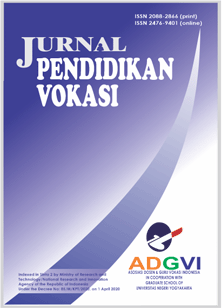Jurnal Pendidikan Vokasi (JPV) is an official peer-reviewed scientific journal that utilizes a double-blind peer-review system and is published by the Graduate School of Universitas Negeri Yogyakarta (UNY) in collaboration with the Asosiasi Dosen dan Guru Vokasi Indonesia (ADGVI). The journal has a rich history as the successor of a previous publication focused on vocational education development in Indonesia. JPV publishes articles in English, having transitioned from bilingual publication (Indonesian and English) in 2021 to cater to a global audience. As an open-access journal, JPV ensures that its content is freely available to readers worldwide.
The journal publishes three issues per year and covers a wide scope, including curriculum development, teaching methods, learning evaluation, skills training, and various other aspects relevant to vocational education and training across different industrial sectors. It accepts various types of articles such as original research articles, review articles, and case studies.
JPV is abstracted and indexed by Dimension, DOAJ, Sinta, and Google Scholar, and is preserved in CLOCKSS and Portico. Articles are assigned Digital Object Identifiers (DOIs) by CrossRef for ease of access and citation. The average time from submission to the first editorial decision is approximately 116 days, and from editorial acceptance to publication is around 120 days, with an acceptance rate of 80%.
Publisher: Graduate School of Universitas Negeri Yogyakarta in collaboration with Asosiasi Dosen dan Guru Vokasi Indonesia (ADGVI)
See the Aims and Scope for complete coverage of the journal.
Current Issue: Volume 14, Number 1 (2024)
Articles
The influence of creativity and learning motivation on entrepreneurial intentions of fisheries vocational high school students
Priyono Priyono, Achmad Imam Agung, I Gusti Putu Asto Buditjahjanto, Lilik Anifah, and Tomi Agfianto
DOI: 10.21831/jpv.v14i1.69869
The effect of local potential-based workshop and entrepreneurship learning in increasing entrepreneurial interest
Octaverina Kecvara Pritasari, Marniati Marniati, and I Wayan Susila
DOI: 10.21831/jpv.v14i1.56910
Evaluation of teaching factory using CIPP (Context, Input, Process, Product) model to improve vocational high school students' skills
Yoto Yoto, Marsono Marsono, Abdul Qolik, and Achmad Romadin
DOI: 10.21831/jpv.v14i1.62573
Analysis of the indirect correlation between academic achievement, intrinsic and extrinsic motivation, and self-efficacy on teaching readiness
Andi Maga Umara, Pardjono Pardjono, and Galeh Nur Indriatno Putra Pratama
DOI: 10.21831/jpv.v14i1.59766
Transforming heavy equipment engineering learning using virtual reality: A literature review and case study
Chamdan Nor Ihwan Tsauri, Putu Sudira, and Muhammad Irfan Luthfi
DOI: 10.21831/jpv.v14i1.61298
Development of a hybrid teaching factory model based on school governance in improving employability skills of vocational students
Sintha Wahjusaputri, Tashia Indah Nastiti, and Yingdong Liu
DOI: 10.21831/jpv.v14i1.65108
Evaluation of student internship programs to support the sustainability of vocational education institutions and industrial cooperation programs
Suhartanta Suhartanta, Ngatman Soewito, Hiryanto Hiryanto, Nunik Sugesti, Yosep Efendi, Siti Perdi Rahayu, and Yusri Bin Kamin
DOI: 10.21831/jpv.v14i1.63585
The effect of Problem-based Learning (PBL) with mockup media in learning programmable logic controller
Suhanto Suhanto, Mustaji Mustaji, Moch. Rifai, Lady Silk Moonlight, Asep Muhamad Soleh, and Ahmad Fudholi
DOI: 10.21831/jpv.v14i1.64622
The influence of Teaching Factory (TEFA) implementation and work readiness on vocational high school students' future job perspectives
Imran Imran, Marji Marji, Hary Suswanto, and Basanta Prasad Adhikari
DOI: 10.21831/jpv.v14i1.66796
The influence of creativity and learning motivation on entrepreneurial intentions of fisheries vocational high school students
Priyono Priyono, Achmad Imam Agung, I Gusti Putu Asto Buditjahjanto, Lilik Anifah, and Tomi Agfianto
DOI: 10.21831/jpv.v14i1.69869
Analysis of improving innovative work behaviour of vocational high school teachers in terms of servant leadership with knowledge sharing as an intervening variable
Hendro Prasetyono, Sumaryati Tjitrosumarto, J. Sabas Setyohadi, Sri Hapsari, and Ira Pratiwi Ramdayana
DOI: 10.21831/jpv.v14i1.65445


